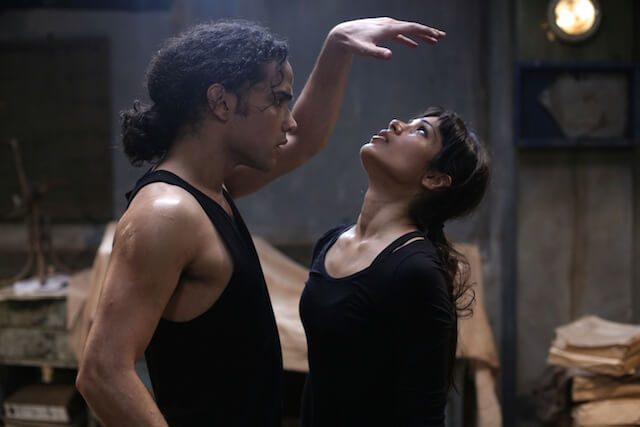‘Desert Dancer’ “Desert Dancer” is a blunt political object spliced with one of the least reputable, but most enjoyable, movie genres. It’s a let’s-put-on-a-dance number, the kind that’s been around since synch sound came to movies and has evolved into “Step Up” movies. The difference is the setting is Iran in 2009 and the punishment for its heroes being caught is torture, imprisonment or death. As a dance movie it’s so-so; it’s better as another cheesy, if far more noble (in a way), genre: the crudely effective ode to freedom for an oppressed people. The characters are thin and the villains are one-note, but one gets worked up anyway, much as one gets played by a solid romance — or a dance movie. It helps that it’s based on a true story, but that shouldn’t be the case. The tale of Afshin Ghaffarian (played by Reece Ritchie) has been presumably pounded down into a readymade genre entry, shorn of nuances and awarded thrilling parts that are at least mild exaggerations. Born into a country after it stopped feting the arts, Afshin learns to keep his passion, stoked by smuggled-in films and later pirated versions of YouTube, on the DL. But dance still needs to get out, and first he forms a dance group with like-minded students then hatches a scheme to do a secret performance in the desert, in the hopes that the obsessively driven morality police won’t find them out. Director Richard Raymond is here for the drama scenes, not the dancing, and so characters only burst into movement when they absolutely have to, and in numbers that tend to be shot with moderate disinterest. The difference is the big number, which is shot with insistent, melodramatic care, and spliced with a suspense sequence for extra, even questionable audience goosing. Audience manipulation can always feel misplaced when it comes to true stories like this, though whatever “Desert Dancer”’s sins (including a slightly ginned-up climax), it never comes close to the absurdity of “Argo”’s outright inventions. Even a subplot about one dancer, played by Freida Pinto, wrestling with heroin addiction seems less like an extra bit of sadness for viewers than a sincere exploration of other ways oppression oppresses the oppressed. In fact, a film about the arts is rare in the political movie, which tends to focus on general ways liberty is curtailed, not so-called frivolous forms of entertainment. In fact, the one thing “Desert Dancer” doesn’t underline, italicize and bold is the idea that art is so powerful and so necessary to mental survival that those that practice it will risk life and limb, knowing full well the horrors that await them if busted. Iran’s homegrown cinema — which, in the case of home-imprisoned filmmaker Jafar Panahi, is sometimes smuggled out buried in cakes on thumbdrives — speaks more deeply about such concerns, but a safe film like “Desert Dancer” that targets Western viewers looking for a decent tearjerker that will stir them to care for others is worthy too.
Director: Richard Raymond
Stars: Reece Ritchie, Freida Pinto
Rating: PG-13
3 (out of 5) Globes
Review: ‘Desert Dancer’ is a bluntly effective political drama

Relativity Media
Follow Matt Prigge on Twitter @mattprigge


















